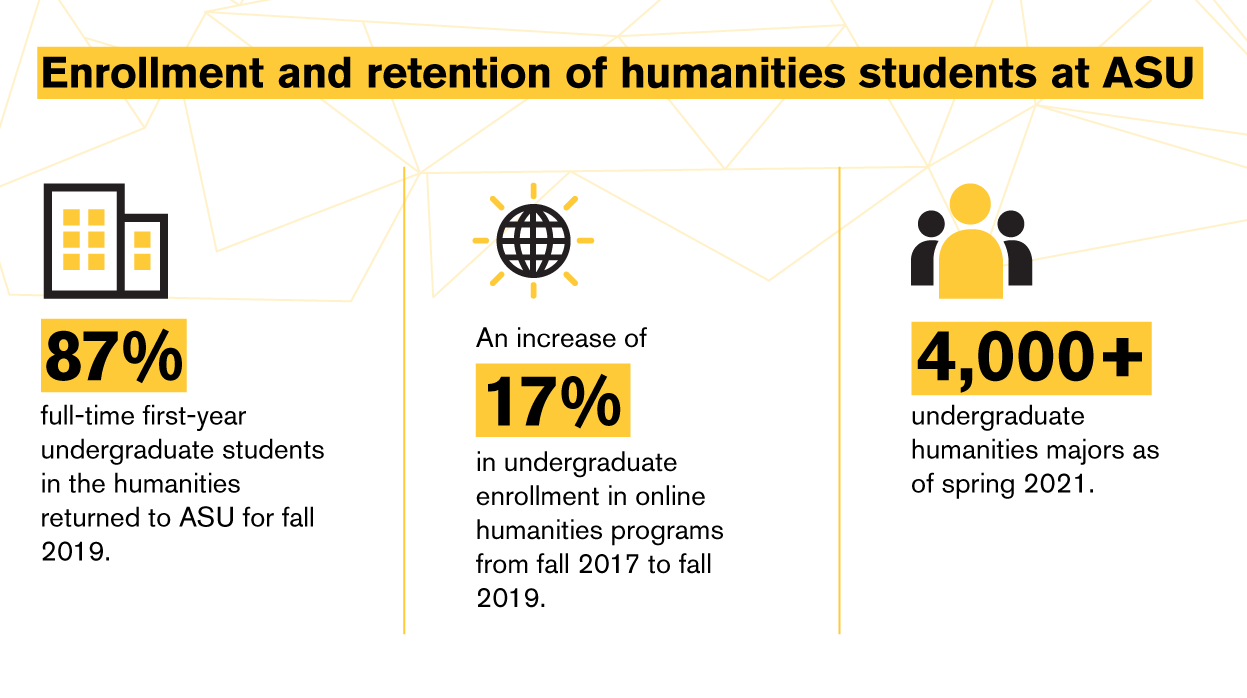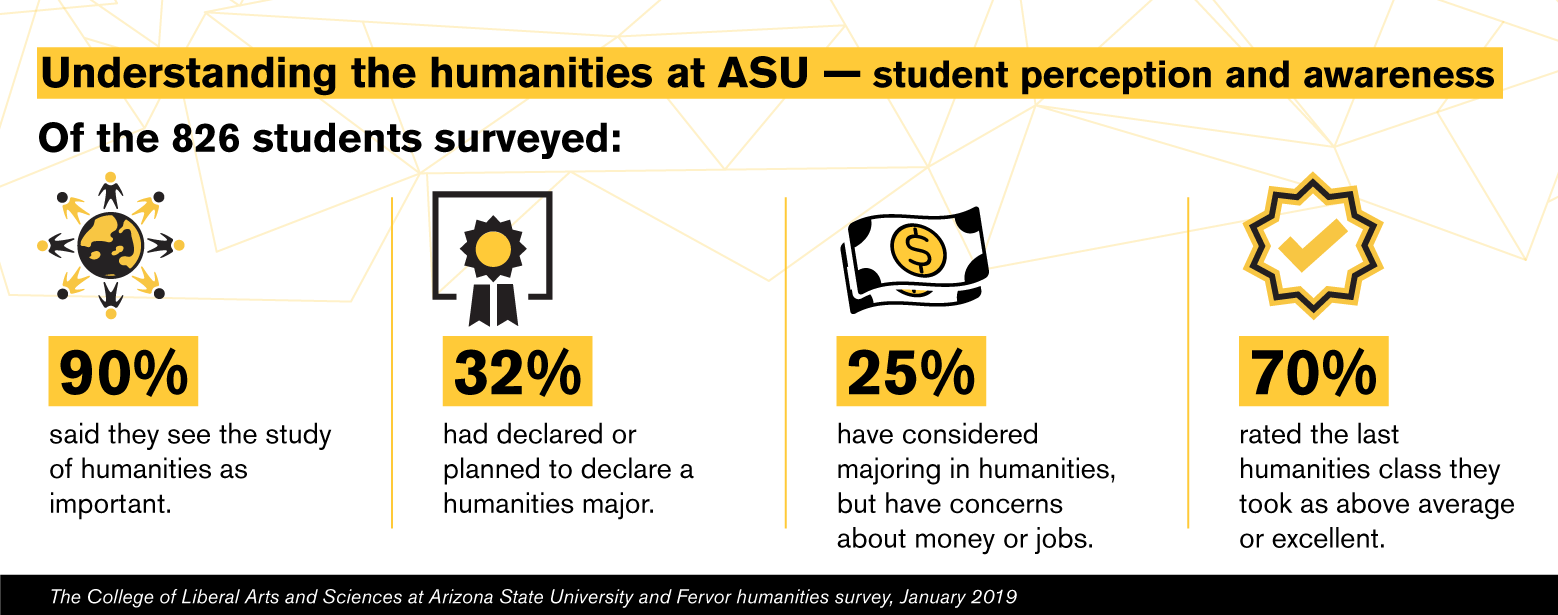Despite a decade of widespread decline in humanities majors and enrollments at higher education institutions nationwide, the humanities division at Arizona State University has increased enrollment numbers in recent years, added new programs and welcomed renowned scholars to its faculty.
From 2017 to 2019, the total number of first-year and transfer undergraduate students majoring in the humanities in The College of Liberal Arts and Sciences at ASU increased, with 87% of full-time first-year undergraduate students in the humanities returning from fall 2018 to fall 2019 and enrollment in online humanities programs growing by 17% from fall 2017 to fall 2019.
Currently, ASU’s humanities division has over 4,000 undergraduate humanities majors — more than the total undergraduate enrollment across all divisions of most liberal arts colleges.
This increase in enrollment and majors and investment in scholars is in large part due to a dedicated campaign envisioned by Dean of Humanities Jeffrey Cohen. Cohen joined ASU in 2018 and was charged with raising the profile of the humanities at the university. Since then, he has worked closely with faculty, staff and students to reinvigorate the humanities division — positioning ASU and The College at the forefront of humanities education, research and innovation.
Starting in 2018, Cohen and The College’s marketing department partnered with Fervor, a local marketing firm, to help better understand student perceptions of the humanities. Together, they surveyed over 800 students about their perceptions of the humanities and their experiences in humanities classrooms. They found that students’ perceptions of the humanities were overwhelmingly positive, with a large majority of respondents agreeing that the humanities are important because they help us understand our place in society and how different cultures affect the world in which we live. These same students rated their humanities courses as among the best they have taken. However, many were unclear about the specific areas of study comprising the humanities or had concerns about what careers humanities training enables.
Humanities faculty members were also surveyed, with 33% of faculty saying they believe the single most important thing that can be done to increase student interest is to show a link between a humanities degree and careers.
Hearing firsthand from students and faculty about their perception of the humanities led to the creation of a thoughtful marketing campaign that would increase awareness of what the humanities are while addressing students’ concerns about job prospects and helping them see the humanities at ASU as a vibrant space offering insight into issues of importance to them.
Read more: ASU in the National Humanities Alliance's "Strategies for Recruiting Students to the Humanities"
Empowering students and faculty
Using the survey responses and data, The College and Fervor developed a comprehensive marketing strategy encapsulated in the tagline — “Building better futures through the exploration of the human adventure across time and place.” The College wanted to emphasize that every student can benefit from studying the humanities, regardless of their educational goals. Cohen shared a summary of the marketing strategy to humanities faculty, highlighting the importance of empowering students to create fulfilling careers and lives.
A keyword in the campaign is “adventure,” which relates to both future-making and the thrill of encountering what the study of literature, languages, history, linguistics, world religions, philosophy, creative writing, rhetoric and film offer.
“It is not about trying to sell anything or to capitalize on fleeting trends,” said Cohen. “Instead, our task is to empower our students to create satisfying lives for themselves by giving them access to the best of what humanities study provides. We know that the life skills imparted through our curriculum — research, writing, language study and reasoned argument — are necessary for success in all careers ... our task is to share that message, consistently and confidently.”
The College’s marketing team built out a new website and video to better inform students of career possibilities, promote the humanities and highlight success stories.
Another focus of the campaign is to include faculty in these efforts to provide students insight into the benefits of a career in the humanities. As highly respected leaders in their fields, capable of encouraging dialogue and advancing ideas, faculty are a key component to reach students and share the possibilities available with a humanities degree.
One way humanities faculty hope to expand their reach to students is through mentorship networks created by the Institute of Humanities Research that will link faculty members with undergraduate students. Cohen has also asked each center in the humanities to incorporate undergraduate outreach into its mission.
New program offerings and renowned faculty
The growing program offerings available in the humanities division, both in-person and online, allow students to pursue a pathway they are truly passionate about. Since 2018, The College has added eight new undergraduate programs to the humanities division including Arabic studies, globalization and culture, religion, culture and public life, as well as four new graduate programs. A cross-humanities degree in culture, environment and technology will be added next year.
New programs and opportunities for students to complement their academic work are regularly emerging within the humanities including things like the Humanities Lab, where students engage in hands-on research on compelling social challenges of interest. In Deconstructing Race — a lab co-taught by professors Isaac Joslin, assistant professor in the School of International Letters and Cultures, and Yeukai Mlambo, assistant research professor in the Mary Lou Fulton Teachers College — students examine the concept of race as an epistemological category in order to better understand the ways in which racialized and racist ideologies have impacted global societies throughout history.
And in the School of Historical, Philosophical and Religious Studies, undergraduate students started an online peer-reviewed journal to showcase undergraduate research in the fields of history, philosophy and religious studies.
Humanities faculty and staff have also developed several ongoing event series to create more awareness about the work being done in the humanities.
Some examples include TomorrowTalks, a newly launched distinguished speaker series led by the Department of English where thought leaders explain how they use writing to address some of society’s most pressing challenges, and RaceB4Race, a conference series and professional network community brought to life by ASU’s Arizona Center for Medieval and Renaissance Studies that highlights the expertise, perspectives and sociopolitical interests of Black and Indigenous scholars and scholars of color.
With these new programs and events came the need to recruit top humanities academics. The College is now home to hundreds of renowned scholars in the field of humanities, with new faculty regularly joining the humanities division to help shift the perception of the humanities across campus.
Ayanna Thompson, professor in the Department of English and one of four Regents Professors for 2021, is among the top scholars of Shakespeare in the world and was named to the board of the Royal Shakespeare Company. She recently led a cluster hire initiative of five new faculty members from around the country in an effort to elevate scholars of color working on issues of race in premodern studies.
Natalie Diaz, director of the Center for Imagination in the Borderlands, associate professor in the Department of English and the Maxine and Jonathan Marshall Chair in Modern and Contemporary Poetry, recently made history as the youngest poet elected to the Academy of American Poets board of chancellors. In 2019, she co-launched Native Narratives, a program that strives to expand on the tradition of storytelling in Native American culture by using it as a tool to prepare students for careers in the humanities and academia.
Building community and looking toward the future
While proud of the growth the humanities division has had over the last few years, Cohen is focused on continuing the growth and success of cultivating a community within the humanities division
“Our students are our strength,” Cohen said. “This campaign has been a great starting point to promote the true value of a humanities education. Our hope is to extend to every ASU student the chance to see what our disciplines offer – and an invitation to make the humanities their own. The future of the humanities at ASU looks bright.”
More Arts, humanities and education

From ASU to the open road: Alumna Gabriella Shead builds a career behind the scenes of Broadway tours
For ASU alumna Gabriella Shead, a career in the theater isn’t about taking center stage — it’s about making sure everything behind the curtain runs seamlessly. Now serving as assistant company…
Canon brings ‘Star Wars’ cinematographer to inspire Poitier Film School students
David Klein never had a mentor.He was scrappy — and lucky — enough to succeed without one as a career cinematographer. His first feature film was the no-frills, DIY darling of ‘90s indie cinema…

Illuminating the season: How a business professor turns holiday lights into lessons on creativity and sustainability
On a December night in Chandler, Arizona, Kevin Dooley’s house doesn’t just twinkle. It beams like a beacon at the end of the cul-de-sac as the windows shimmer with color, and every corner…


